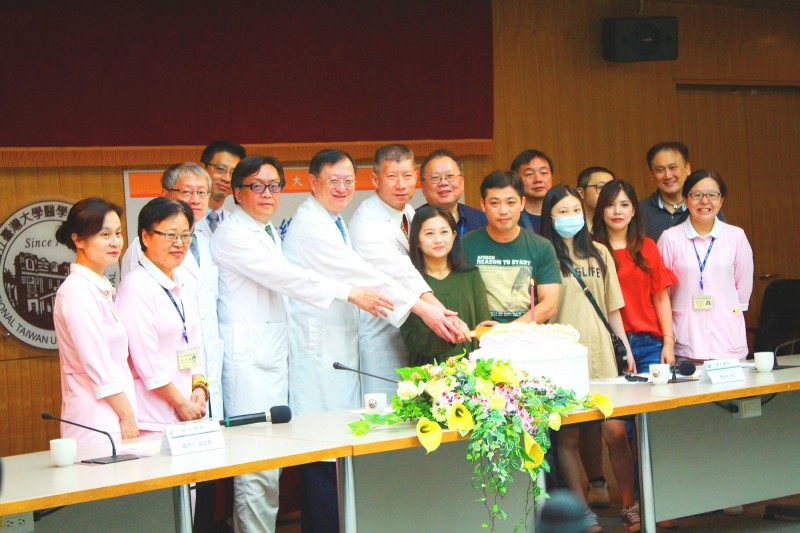《TAIPEI TIMES》 Woman receives transplant 50 days after heart stops

National Taiwan University Hospital (NTUH) vice superintendent Yu Chong-jen, sixth left, NTUH Cardiovascular Center director Chen Yih-sharng, seventh left, cut a cake with their patient, surnamed Chen, eighth left, at a news conference in Taipei yesterday. Photo: CNA
By Lee I-chia / Staff reporter
National Taiwan University Hospital (NTUH) yesterday said that it has carried out a heart transplant on a woman whose heart had stopped beating 50 days before, marking a new record in the nation.
The 38-year-old woman surnamed Chen (陳) was in October last year stung by a bee while visiting Japan and she developed an acute fever and heart failure that led to cardiac arrest shortly after she returned to Taiwan.
The hospital immediately applied extracorporeal membrane oxygenation (ECMO) and waited for a suitable donor heart for transplant, as four available donor hearts were incompatible.
NTUH Cardiovascular Center director Chen Yih-sharng (陳益祥) yesterday said that the woman had acute myocarditis caused by an allergic reaction to the bee sting and her heart was barely beating when she was hospitalized.
After a cardiac ultrasound showed that her heart was hardly functioning, two ECMO systems were used to keep her alive while waiting for a transplant, he said.
She had complications — including acute kidney failure and small blood vessel blockage due to blood clots — during the wait, so the surgical team had to come up with a desensitization plan to remove harmful antibodies from her blood to reduce the risk of her body rejecting a transplant, he added.
“We had to use immunological methods to desensitize her body to reduce the risk of transplant rejection, but it was not totally without danger, because the use of immunosuppressive agents might lead to infections,” Chen Yih-sharng said.
A transplant was finally completed in December last year and the new heart has been functioning properly over the past six months, he said.
The woman could have had a stroke at any time during the waiting period and the surgical team had growing concerns that she would remain in a vegetative state even after the transplant, Chen Yih-sharng said, but added that she still demonstrated slight reactions, a computed tomography scan showed no cranial bleeding and her family was very supportive.
The woman yesterday said that at the time, she could hear sounds around her, but could not move her body.
Noting that at the time she needed transfusions of up to 3 liters of blood per day, she expressed gratitude to all involved in saving her life.
The woman’s husband, surnamed Chin (秦), said that at first, after being informed of the situation in the intensive care unit, he could not accept that his wife’s heart had stopped beating.
However, because he did not want to give up hope, he said that he visited and talked to her several times a day while she waited for a donor heart.
The average waiting period for a heart transplant at NTHU is about 40 days, Chen Yih-sharng said.
Family support was also very important, because it allowed the surgical team to put all their efforts into saving the woman, he added.
新聞來源:TAIPEI TIMES















